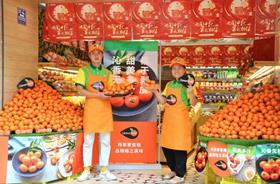
Rogue fresh produce agents in Asia who employ counterfeit branding methods, including imitation fruit stickers, to mislead shop owners and consumers, has been warned by ClemenGold International that it will take steps to protect its brands.
“The ClemenGold brand is one of our most valuable assets, and we continually invest in growing awareness and brand loyalty,” said Adéle Ackermann, marketing manager of ClemenGold International.
“To protect the brand integrity, but also to protect our clients who have entered into supply agreements with us, we wish to remind traders that ClemenGold International is the exclusive owner for the ClemenGold®trademarks in a number of countries including China,' she explained. 'The unauthorised use of the ClemenGold brand, the word ClemenGold, the logo, fruit sticker of packaging, is illegal.”
Ackermann said that in the current fresh produce marketplace, where success does not simply rest on a good balance between supply and demand and healthy prices, the presence of a strong and well-established brand has become the game-changer.
“For ClemenGold, the globally available premium mandarin brand managed from South Africa, its widely recognised teardrop-shaped fruit sticker has become a symbol of consistent quality,' she continued. 'Consumers have come to trust the brand for its superior eating experience derived from a strict set of internal and external quality standards. At the same time wholesale and retail clients benefit from the equity a highly visible and well-executed brand holds for them.
“The success of the internationally registered ClemenGold trademarks has brought it into the crosshairs of rogue fresh produce agents in Asia who employ counterfeit branding methods, including imitation fruit stickers, to mislead shop owners and consumers.'
“What makes a good trademark is not how unique the word or the logo is, but it being seen in the marketplace for a long time, and with the ClemenGold trademark we have managed to place our unique logo in the right place, at the right time for a long period,” said Maanda Phosiwa, intellectual property manager for ClemenGold International. “The marks have become quality citrus persona and identity in the marketplace. However, with such success, ClemenGold International is aware of imitations popping up in the market.
“When we see any imitation in the market, we have successfully investigated the sightings,' Phosiwa confirmed. 'Most of the imitators are not aware that we have registered rights and successfully cease to use the imitation as soon as we get in touch with them.
'We have successfully managed to convince numerous imitators in China to cease the use of imitations, undertaking not to accept any imitation and respect our right in the market. We will continue our efforts to enforce our rights and not allow any imitations or passing off, as both have the potential to erode our brand identity.”
In addition to the widely recognised packaging and fruit sticker, she said, the company also employs the use of a uniquely teardrop-shaped Gesvatec sticker on each box that leaves South Africa for any country in the world.
Gesvatec is an international identification system which provides the control mechanisms necessary to manage the legality of protected or value-adding products, and to avoid the possible fraudulent use that can arise in the process of their commercialisation.
This marker certifies that the box contains a registered variety, has been packed and inspected according to strict specifications and that the receiver of the box has permission to trade.
The different elements, including a QR code and serial number, enable traceability of the fruit.



